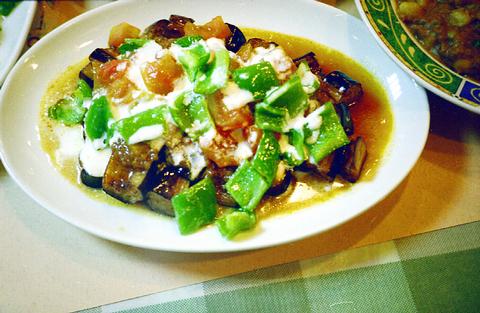If you're looking for a delicious, moderately-priced Indian restaurant where you can fill the table with a bumper crop of masalas, chick peas, curries and nan (Indian style unleavened bread), Kunming is one of the best in Taipei. The restaurant offers classic recipes from India, the Middle East and parts of Southeast Asia, giving stiff competition to the best dishes at any of Taipei's other Indian restaurants.
The prices at Kunming are an extra bonus. Vegetable plates, salads and hummus begin at NT$120, with more expensive dishes like Tandoori chicken topping out the menu at NT$250. Even the biggest feasts (it's best to go with a few people) seldom produce a bill that exceeds NT$350 a person, which is a bargain compared to the NT$600 or more one would have to pay for a similar meal elsewhere.
The musakka (NT$240) is exceptionally good. A Turkish recipe, the dish consists primarily of finely-ground beef that is seasoned and cooked with eggplant. The platter is then topped with green peppers, tomatoes and a trace of yogurt sauce. Samosas (NT$120), an appetizer of fried pastries stuffed with vegetables and served with sauce, are likewise delicious. Indian milk tea (NT$50) serves as a perfect cap to any meal.

PHOTO: DAVID FRAZIER, TAIPEI TIMES
Kunming is run by Yacoob Mah (馬雲昌) whose family originally hails from Yunnan, but was forced to flee to Burma in World War II and eventually made it to Taiwan 20 years ago. The family then opened its restaurant using a mix of recipes acquired over the years.
The only area in which Kunming could be said to be lacking is in its decor. The carved-wood furniture, the odd lamps and other elements associated with Indian dining rooms are not to be found. Instead, the interior lends itself more to the slightly drab non-style of mid-range Taiwanese eateries, with the addition of minor touches, like a large picture of the Taj Mahal on one of the concrete walls.
Even so, the general atmosphere is comfortable, and the owner is apt to play the genial host. Repeat customers are often greeted with a smile and sometimes rewarded for their patronage.

Most heroes are remembered for the battles they fought. Taiwan’s Black Bat Squadron is remembered for flying into Chinese airspace 838 times between 1953 and 1967, and for the 148 men whose sacrifice bought the intelligence that kept Taiwan secure. Two-thirds of the squadron died carrying out missions most people wouldn’t learn about for another 40 years. The squadron lost 15 aircraft and 148 crew members over those 14 years, making it the deadliest unit in Taiwan’s military history by casualty rate. They flew at night, often at low altitudes, straight into some of the most heavily defended airspace in Asia.

Beijing’s ironic, abusive tantrums aimed at Japan since Japanese Prime Minister Sanae Takaichi publicly stated that a Taiwan contingency would be an existential crisis for Japan, have revealed for all the world to see that the People’s Republic of China (PRC) lusts after Okinawa. We all owe Takaichi a debt of thanks for getting the PRC to make that public. The PRC and its netizens, taking their cue from the Chinese Communist Party (CCP), are presenting Okinawa by mirroring the claims about Taiwan. Official PRC propaganda organs began to wax lyrical about Okinawa’s “unsettled status” beginning last month. A Global

Taiwan’s democracy is at risk. Be very alarmed. This is not a drill. The current constitutional crisis progressed slowly, then suddenly. Political tensions, partisan hostility and emotions are all running high right when cool heads and calm negotiation are most needed. Oxford defines brinkmanship as: “The art or practice of pursuing a dangerous policy to the limits of safety before stopping, especially in politics.” It says the term comes from a quote from a 1956 Cold War interview with then-American Secretary of State John Foster Dulles, when he said: ‘The ability to get to the verge without getting into the war is

Like much in the world today, theater has experienced major disruptions over the six years since COVID-19. The pandemic, the war in Ukraine and social media have created a new normal of geopolitical and information uncertainty, and the performing arts are not immune to these effects. “Ten years ago people wanted to come to the theater to engage with important issues, but now the Internet allows them to engage with those issues powerfully and immediately,” said Faith Tan, programming director of the Esplanade in Singapore, speaking last week in Japan. “One reaction to unpredictability has been a renewed emphasis on